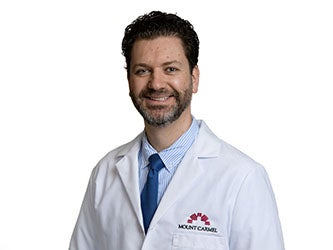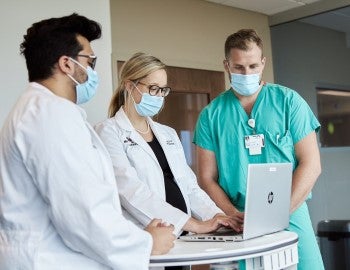Mount Carmel Research Institute
The Mount Carmel Research Institute (MCRI) cultivates and integrates the latest research technologies and treatments into our patient care experience through investigator-initiated and industry-sponsored clinical trials. Our mission is to advance patient care through research initiatives that directly contribute to a transforming and healing presence within our communities.
183
Investigators (2021)
200+
Academic & Industry Sponsored Trials
>1,300
Research Encounters Annually
ONE MISSION:
Advance patient care through research initiatives that directly contribute to a transforming and healing presence in our community.
News and Breakthroughs
Dr. Laura Gravelin awarded competitive funding from Medtronic to study implementation of artificial intelligence to reduce healthcare inequity in heart failure patients.
 It is known that implantable cardioverter-defibrillators (ICDs) can prevent sudden cardiac death after acute myocardial infarction. However, reports estimate that up to 80% of eligible patients do not receive guideline-directed counseling for ICDs (Hess et al, Circulation, 2016). Of note, women are less likely than men to receive counseling, and persons of color were less likely than their white counterparts to receive counseling after accounting for other patient and hospital characteristics (Johnson et al, Pace, 2018). Taken together, ICD underutilization is a significant problem that disproportionately affects women and minorities.
It is known that implantable cardioverter-defibrillators (ICDs) can prevent sudden cardiac death after acute myocardial infarction. However, reports estimate that up to 80% of eligible patients do not receive guideline-directed counseling for ICDs (Hess et al, Circulation, 2016). Of note, women are less likely than men to receive counseling, and persons of color were less likely than their white counterparts to receive counseling after accounting for other patient and hospital characteristics (Johnson et al, Pace, 2018). Taken together, ICD underutilization is a significant problem that disproportionately affects women and minorities.
Against that background, Dr. Laura Gravelin (Co-Director of Mount Carmel's Women's Heart Program), was awarded $102K in competitive funding from Medtronic to lead an investigator-initiated pilot study to address healthcare inequities in heart failure patients. This industry/academic collaboration leverages an Artificial Intelligence (AI) and Machine Learning (ML) software to conduct an unbiased query of electronic medical records in order to identify patients eligible to receive (ICDs) and provide counseling services. This effort addresses a number of Trinity TogetherHealth 2023 priorities including reducing health inequities, eliminating racism, and operationalizing digital clinical process innovations that drive transformation.
Dr. Joseph Jozic leads investigator-initiated trial testing the safety and efficacy of state-of-the art endovascular devices for the treatment of myocardial infarction in elderly patients.
 Ischemic heart disease is the leading cause of death in the United States, with ST-segment elevation myocardial infarction (STEMI) accounting for over 300,000 cases each year. The latest advances in STEMI treatment include endovascular devices (stents, guidewires, and radial artery access devices) that were designed to improve minimally invasive approaches of percutaneous coronary intervention (PCI). Despite these advances, older STEMI patients have historically been underrepresented in clinical trials for these devices in part due to multi-vessel disease, comorbidities, and higher complication rates than younger counterparts.
Ischemic heart disease is the leading cause of death in the United States, with ST-segment elevation myocardial infarction (STEMI) accounting for over 300,000 cases each year. The latest advances in STEMI treatment include endovascular devices (stents, guidewires, and radial artery access devices) that were designed to improve minimally invasive approaches of percutaneous coronary intervention (PCI). Despite these advances, older STEMI patients have historically been underrepresented in clinical trials for these devices in part due to multi-vessel disease, comorbidities, and higher complication rates than younger counterparts.
Interventional cardiologist, Dr. Joseph Jozic, seeks to test the safety and efficacy of several state of the art PCI devices in underrepresented elderly patients as an investigator in the SAFE-STEMI trial. In this study, patients 60 years and older that require PCI will have access to 3rd generation drug-eluting stents, radial artery access devices that potentially reduce bleeding complications, and guidewires that may enable faster and more efficient revascularization in patients with multivessel coronary artery disease.
MCRI Supports Education on Epic Reporting
 Mount Carmel is now live with Epic and data continually accumulates in the system. To support the transition, MCRI has provided staff to teach Epic reporting classes (Reporting 100, Reporting 200, and SlicerDicer). These classes help MCHS colleagues extract data from Epic for operational and analytic purposes. Reports can be obtained through the “Reporting Workbench,” which contains many pre-developed templates for quickly acquiring the most commonly needed information, and “SlicerDicer”, a more flexible and interactive reporting tool for which the user specifies almost all aspects of the report. A recent enhancement to SliceDicer involves the ability to link different data models together to increase the information available for any one report. As the historical record builds within Epic, MCRI anticipates that these reporting tools will facilitate new research ideas and empower our providers with the tools to directly support data collection.
Mount Carmel is now live with Epic and data continually accumulates in the system. To support the transition, MCRI has provided staff to teach Epic reporting classes (Reporting 100, Reporting 200, and SlicerDicer). These classes help MCHS colleagues extract data from Epic for operational and analytic purposes. Reports can be obtained through the “Reporting Workbench,” which contains many pre-developed templates for quickly acquiring the most commonly needed information, and “SlicerDicer”, a more flexible and interactive reporting tool for which the user specifies almost all aspects of the report. A recent enhancement to SliceDicer involves the ability to link different data models together to increase the information available for any one report. As the historical record builds within Epic, MCRI anticipates that these reporting tools will facilitate new research ideas and empower our providers with the tools to directly support data collection.
Reminder: MCHS Research & Evidence-Based Practice Day
 The 10th Annual MCHS Research & Evidence-Based Practice Day is scheduled for May 4, 2022, with abstract submissions due February 21, 2022. Mark your calendars for this multidisciplinary forum for MCHS clinicians and administrative leaders to learn about results obtained from research and evidence-based practice projects conducted at our institution. This conference facilitates knowledge translation leading to improvements in healthcare processes.
The 10th Annual MCHS Research & Evidence-Based Practice Day is scheduled for May 4, 2022, with abstract submissions due February 21, 2022. Mark your calendars for this multidisciplinary forum for MCHS clinicians and administrative leaders to learn about results obtained from research and evidence-based practice projects conducted at our institution. This conference facilitates knowledge translation leading to improvements in healthcare processes.
Topics are varied and of interest to a wide audience. Last year, attendees from across Trinity learned about MCHS projects covering topics such as reducing readmission after hospitalization for stroke, the frequency and consequences of overdiagnosing heparin-induced thrombocytopenia (HIT), assessing deep learning algorithms for their generalizability, and many more. This event will offer 2.5 hours of CME/CEU.
Let MCHS and Trinity know about your efforts to advance knowledge and improve patient care by submitting an abstract at researchday.mchs.com.



